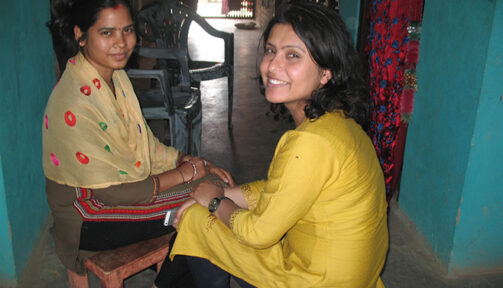Access to adequate food and nutrition is challenging for many newly married women in Nepal. Due to their lower social status, young married women frequently experience nutrient deficiencies that lead to them and their babies being malnourished. A new UCSF study seeks to intervene and improve young women’s health.
Many young women in Nepal are married before the age of 18. Upon marriage, they are expected to move into their in-laws’ houses, quickly become pregnant and do most of the household labor, including cooking. But they are often served last, and many become malnourished and experience nutrient deficiencies like anemia. These deficiencies can be dangerous and lead to poor health outcomes, both for the young woman and her baby.

“It’s a patriarchal society,” said Nadia Diamond-Smith, PhD, MS, associate professor of epidemiology and biostatistics. “Young, newly married women have a much lower household status. They are under a lot of pressure to do household labor and prove their worth by providing an heir.”
Diamond-Smith was recently awarded an R01 grant from the National Institutes of Health (NIH) of $2.5 million over five years to study an intervention to treat nutrient deficiencies among Nepal’s young women. “It’s not just about maternal health,” Diamond-Smith said, “this can have longer implications for a woman’s health throughout her life-course.”
A Pilot Study Paved the Way
The study looks at an intervention called Sumadhur, which means “best relationship” in Nepali. Diamond-Smith and her colleagues developed and tested this group-based intervention in a pilot study with 90 participants and published the results in the journal Reproductive Health in May 2023. They found that when newly married young women, their husbands, and their mothers-in-law — deemed “household triads” — participated in community-based educational groups, family dynamics improved, and understanding of nutrition and family planning increased.
“There were individual knowledge gaps, but there were also household and community knowledge gaps,” Diamond-Smith said. “Structuring the intervention with household triads instead of just with women allowed us to share knowledge and build relationships across triads and the community.”
Diamond-Smith said that initially, she was unsure if the intervention would work. Many newly married women in Nepal are rarely allowed outside the house. They must navigate gender and cultural norms, including less access to education, higher unemployment rates and limited social agency. But in the end, she said, “study participants liked and accepted the intervention, and attendance was high.”
Expanding to 70 Villages Across Nepal
The grant from the NIH will allow Diamond-Smith and her team to expand the Sumadhur intervention to even more communities. They will study 70 villages in the upcoming randomized control clinical trial, half of which will contain groups that are given multiple micronutrient supplements (MMS) at health facilities, while the other half will contain groups that receive MMS directly in the home plus the Sumadhur educational intervention. “I think there’s a growing acceptance that you can’t just give people pills,” Diamond-Smith said, “you also need to work on behavior change.”
The researchers will study whether the intervention is effective at treating micronutrient deficiency and anemia in newly married women, and it will also examine the cost-benefit of the intervention and its impact on gender norms and household relationships. While they are not measuring birth outcomes, they hope this will also help get micronutrients to women trying to get pregnant or in the early stages of pregnancy, when certain vitamins like iron and folate are critical.
“Addressing anemia and micronutrient deficiencies before pregnancy is crucial for optimal maternal health, fetal development during the critical first trimester, and long-term intergenerational health benefits,” said Mahesh Puri, PhD, MSc, co-director of the Centre for Research on Environment Health and Population Activities in Nepal and a research partner on the study.
Diamond-Smith said that she hopes the study will lead to multiple types of improvements in the lives of newly married young women in Nepal. “I’m interested in promoting women’s empowerment,” Diamond-Smith said, “along with shifting household norms and understanding the value of women’s nutrition.”

